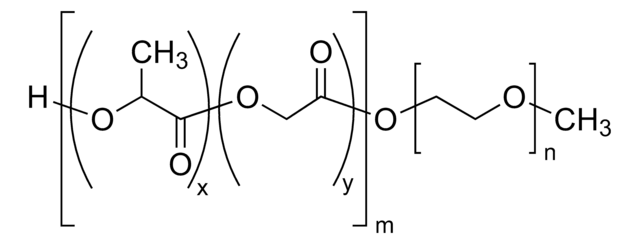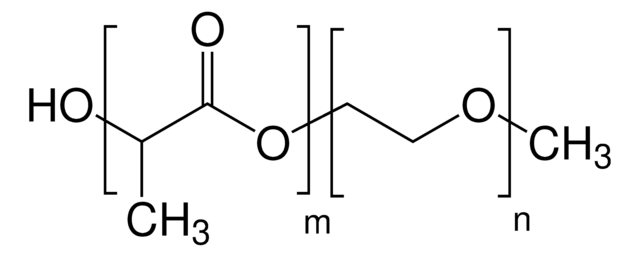764760
Poly(ethylene glycol) methyl ether-block-poly(lactide-co-glycolide)
PEG average Mn 2,000, PLGA average Mn 11,500
Sinónimos:
PEG-PLGA, Polyethylene glycol, mPEG-b-PLGA
About This Item
Productos recomendados
form
pellets
Quality Level
feed ratio
lactide:glycolide 50:50
mol wt
PEG average Mn 2,000
PLGA average Mn 11,500
average Mn 13,500 (total)
degradation timeframe
1-4 weeks
transition temp
Tm 298-303 °C
Tg 40 °C (PDLLA block)
Tg 6 °C (PEG block)
PDI
≤2.0
storage temp.
2-8°C
¿Está buscando productos similares? Visita Guía de comparación de productos
General description
Application
Features and Benefits
- Good biocompatibility, low immunogenicity and good degradability.
- Properties can be easily modulated by changing the block copolymer segment sizes to suit a particular application.
Storage Class
11 - Combustible Solids
wgk_germany
WGK 3
flash_point_f
Not applicable
flash_point_c
Not applicable
Elija entre una de las versiones más recientes:
¿Ya tiene este producto?
Encuentre la documentación para los productos que ha comprado recientemente en la Biblioteca de documentos.
Los clientes también vieron
Artículos
Micelle formation addresses low solubility in IV drug delivery, overcoming clinical limitations.
Micelle formation addresses low solubility in IV drug delivery, overcoming clinical limitations.
Micelle formation addresses low solubility in IV drug delivery, overcoming clinical limitations.
Micelle formation addresses low solubility in IV drug delivery, overcoming clinical limitations.
Nuestro equipo de científicos tiene experiencia en todas las áreas de investigación: Ciencias de la vida, Ciencia de los materiales, Síntesis química, Cromatografía, Analítica y muchas otras.
Póngase en contacto con el Servicio técnico







